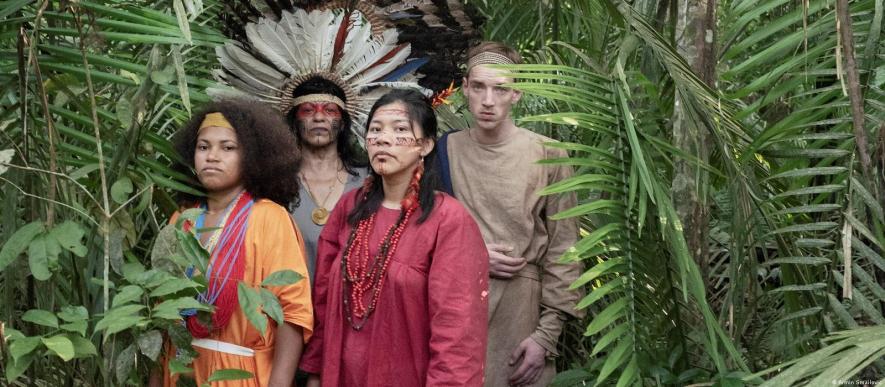Ancient Greek Play Echoes Fight to Protect Amazon

Ancient Greek poet Sophocles couldn't have possibly imagined that his tragedy "Antigone" would remain topical some 2,400 years after the play was first performed.
"Antigone" tells the story of Creon, a tyrant who wants to stay in power at all costs. Convinced that she is doing the right thing according to the gods, Antigone defies him. The matter does not end well. Creon condemns her to be buried alive, but Antigone evades judgment by committing suicide.
A 21st-century Antigone
Swiss playwright and director Milo Rau has brought the mythical Antigone into the present.
Rau is famous for his political projects. Among others, he staged a play examining the Rwandan genocide, and he focused on the inhumane situation in the southern Italian Matera refugee camp in his film "The New Gospel."
His modern version of "Antigone" deals with the destruction of the Amazon.
Indigenous actress and activist Kay Sara plays the lead role, alongside members of the activist group Movimento dos Trabalhadores Sem Terra (MST), which is the largest landless workers' movement in the world.
They are fighting for a reform of Brazil's land ownership system, and for a fairer society.
![]()

Rehearsal for 'Antigone in the Amazon'Image: Armin Smailovic
The topics explored by the project include greed for profit, the overexploitation of nature, and displacement. Rau and his team had already traveled to the Brazilian state of Para in 2020 to work on "Antigone."
At the time, Jair Bolsonaro had been in office as president for a year. He had already disempowered the governmental protection agency National Indigenous People Foundation, FUNAI, and appointed an environment minister who denied climate change. Bolsonaro also stated that he would welcome the landless workers' movement with "a loaded gun."
This political background inspired Rau to stage a new edition of Sophocles' classic tragedy.
The production was set to premiere in April 2020, on a street in the Brazilian state of Amazonas, where police officers once murdered numerous landless people. The production was also supposed to head to Vienna afterwards. But the coronavirus pandemic shelved those plans.
Instead, Kay Sara gave an impressive speech on the internet: "I would have played Antigone, who rebels against the ruler Creon ... The chorus would have consisted of survivors of a massacre of landless people by the Brazilian government. We would have performed this new Antigone on an occupied road through the Amazon — those forests on fire. It would not have been a play, but a political action. Not an act of art, but an act of resistance: against that state power that is destroying the Amazon."
'The heart of this planet will stop beating'
Kay Sara, who hails from the village of Lauarete, grew up in Manaus, the capital of Amazonas. On her father's side, she belongs to the third clan of the Tariano people, the Clan of Thunder. On her mother's side she is a Tukana. Kay Sara's name means "she who cares for others."
![]()

Kay Sara plans to use her voice as an actress to heighten awareness of the plight of the Indigenous peoples in the AmazonImage: Kay Sara
The Indigenous woman is concerned for her native country. "The forests are burning in the Amazon," she says, adding that the problem is that the world has become accustomed to the knowledge that the forests are burning and the peoples are dying.
"A few years ago, the tributaries of the Amazon river dried up for the first time in living memory. In 10 years, the Amazon ecosystem will tip if we don't act now. The heart of this planet will stop beating."
Sara became an actress so her voice would be heard when she spoke. For centuries, it was always other people, including the colonial rulers, who spoke about the Indigenous people. "It's time for us to tell our story ourselves," she argues.
'All governments were Creon'
People ask her over and over again why she left her village — imagined as an idyll in the forest in the Amazon rainforest. Unfortunately, Sara explains, this image has nothing to do with reality: "It's not such a beautiful, wonderful place. It is a colonized place, marked by violence," she told DW. "It is a place where Indigenous women have been raped, Indigenous people have been massacred and murdered."
The place where Kay Sara feels at home is in the arts. "That's where I'm heard; that's where I become visible," she says. Everyone is used to Native people getting involved in politics, she says, but art has enabled her to communicate with more consideration. "I think people listen more then," she adds.
And now they will listen again, as rehearsals finally start again for "Antigone in the Amazon."
![]()

Once, huge trees stood in this very spotImage: Armin Smailovic
But for the Indigenous peoples in the Amazon, Bolsonaro wasn't the only tyrant, Kay Sara told DW. "We were always oppressed, always below all the other peoples. So for us, all governments were Creon."
The 27-year-old hopes things will improve under Brazil's new president, Luiz Inacio Lula da Silva — even if during his previous term in office from 2003 to 2011, he failed to establish strong policies to protect Indigenous peoples. In fact, there were several deadly conflicts over the lands in the Amazon under his administration.
Kay Sara voted for Lula all the same, because this time around, he promised to work for the environment and for minorities.
She says it's a good sign that the new president has appointed Sonia Guajajara, an environmental and human rights activist from the Guajajara tribe, as minister of Indigenous peoples — a position that didn't previously exist in Brazil.
It's a great step forward, Sara says: "Four years ago, we Indigenous people had no one in this position of power. Now we can continue to have hope."
![]()

Kay Sara says she loves the sounds of the rainforestImage: Kay Sara
As a modern-day Antigone, Kay Sara wants to be part of the process of change and stop the further destruction of the rainforest by profit-hungry politicians and big landowners.
"This madness has to stop. We have to stop being like Creon — let's be like Antigone. Because when lawlessness becomes law, resistance becomes our duty," she says.
The world can learn from Indigenous peoples how to live in harmony with nature, she says. But, she adds, they first have to be willing to do that.
This article was originally written in German.
Get the latest reports & analysis with people's perspective on Protests, movements & deep analytical videos, discussions of the current affairs in your Telegram app. Subscribe to NewsClick's Telegram channel & get Real-Time updates on stories, as they get published on our website.



















